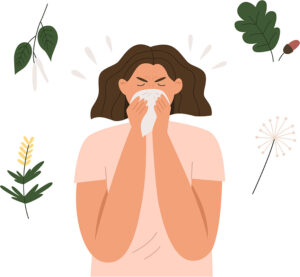Allergy season is coming as trees begin releasing pollen in March here in Central New York
By Eva Briggs, MD
 Gesundheit! Or God bless you! Those are two common responses when someone sneezes.
Gesundheit! Or God bless you! Those are two common responses when someone sneezes.
Allergy season is coming as trees begin releasing pollen in March here in Central New York. So, we will be likely to hear a lot of those phrases.
Sneezing is a process where the body attempts to expel irritants from the nasal cavity. Triggers include allergens, for example pollen and animal dander.
Infections such as viral upper respiratory infections can provoke sneezing. It’s an efficient way for viruses to make their way from a sick person into the airways of their contacts, spreading the illness.
Some people sneeze in response to bright light. This is called the photic sneeze reflex and manifests as uncontrollable sneezing with sudden exposure to sunlight. Usually it’s a mild reaction, although it is potentially dangerous for drivers and pilots. There seems to be a genetic component because it often runs in families. Some people sneeze in response to a full stomach, also an inherited phenomenon. It’s called snatiation — a new word that I learned while researching this article.
During a sneeze, the palate and uvula (that thing hanging down in the back of the throat) move in a way as that accelerates the air leaving the lungs and forces it out through the nose. Particles in the sneeze can travel several feet at speeds up to 100 mph. For this reason, there are a few maneuvers to help reduce the spread of infectious materials. Ideally look downward when you sneeze. Cover your mouth by sneezing into your elbow, a tissue or a handkerchief. Covering your mouth with your hand can block the sneeze but it coats your hand with germs. And sneezing into your fist is pretty much useless, it merely splits the flow.
It’s a myth that you can’t sneeze with your eyes open. It’s also a myth that your heart stops when you sneeze.
There’s not much that will stop a sneeze in its tracks once it’s started. Holding your nose is not recommended. That magnifies the pressure potentially harming your nose and lungs and it doesn’t stop the sneeze. Avoiding allergic triggers and treating allergies can help prevent sneezing.
How did the tradition of saying “Bless you” after a sneeze begin? No one knows for sure as it dates back to the Middle Ages. There are several hypotheses.
Perhaps it started with the pandemics of the 14th century, with the hope that this would prevent the sneezer from contracting a lethal disease. Or maybe it stems from the Renaissance belief that that the heart stopped during a sneeze. A third idea is that it expresses hope that it will prevent the sneezer from catching the cold, flu or similar illness. The word gesundheit — which was our family’s tradition — comes from the German word meaning health. It also expresses the hope that the phrase will ward off sickness.
Sneezing isn’t confined to humans. Not only do mammals like cats, dogs and horses sneeze — but even reptiles like iguanas sneeze!
 Eva Briggs is a retired medical doctor who practiced in Central New York for several decades. She lives in Marcellus.
Eva Briggs is a retired medical doctor who practiced in Central New York for several decades. She lives in Marcellus.

